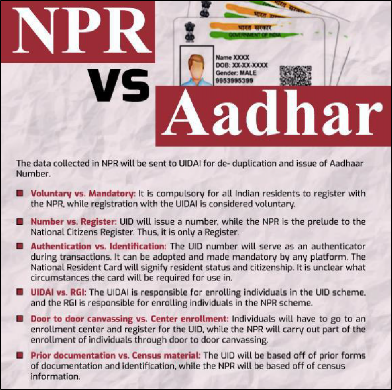Benefit of NPR
♤ Database of residents: It will help to create a comprehensive identity database of its residents with relevant demographic details and also streamline data of residents across various platforms.
♤ Better implementation: It will help the government formulate its policies better and also aid national security.
o Not only will it help target government beneficiaries in a better way, but also further
cut down paperwork and red tape in a similar manner that Aadhaar has done.
o Ministry of Home Affairs has argued that the NPR would be more suited for distributing subsidies than the UID, as the NPR has data linking each individual to a household.
♤ Remove any errors: For e.g. It is common to find different date of birth of a person on different government documents. NPR will help eliminate that.
♤ Avoid duplication: With NPR data, residents will not have to furnish various proofs of age, address and other details in official work. It would also eliminate duplication in voter lists, government insists.
There are genuine divergences in the objectives of NPR and UIDAI.
Their worldviews are from different eras. While one is rooted in a mindset of exclusion and security, the other is inclusive and participative.

NPR has always been an exercise in achieving and establishing greater control over people.
Aadhaar is an exercise in de-bureaucratisation to empower every single Indian to delink himself from the rent-seeking bureaucracy that was siphoning off his benefits in collusion with contractors and politicians.
The progress of the two overlapping identity databases was stymied by a tug of war between the home ministry and the UIDAI, after both tried to independently procure biometric data. Led by
founder chairman Nandan Nilekani, UIDAI hit the ground running – leaving the bureaucracy-
driven NPR far behind. NPR was also slow because it enrolled people in accordance with households, not just individuals.
